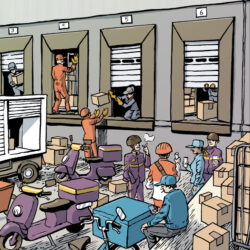John Tros, BME: “We function as a shock absorber between customers and suppliers”

The more volatile the market, the higher the demands placed on wholesalers. This is especially true for building materials. In construction, various circumstances make forecasting difficult. Issues such as transport costs as well as national laws and regulations add to the complexity. Managing that complexity is the core task of John Tros, who is responsible for operations at Building Materials Europe (BME). “I love getting the most out of what we have, every day.”
With his team of local supply chain directors and procurement directors, John Tros is responsible for procurement and logistics at BME, one of the largest building materials wholesalers in Europe. The company has been part of Blackstone since 2019. Tros came on board in 2020 to integrate acquired companies faster and increase synergy in procurement. His role has since broadened to include everything related to logistics.
With a million different products sold, a purchasing volume of €4.5 billion and over 900 branches in eight European countries, BME has a scale that influences how the market operates. “We are the cushion between suppliers and contractors, who face a lot of planning uncertainty. We act as a kind of shock absorber and ensure that, despite their limited forecasting capabilities, our customers still get the products they ask for.”
As a former consultant and partner at KPMG, he thought he had seen it all in procurement and supply chain. “But I was mistaken. I didn’t know it could be so complex to deliver products, which are so simple at their core, to the right location at the right time and at the right cost.”
What makes your business so complex?
“There are many factors. Firstly, the often suboptimal forecasts from customers. New construction projects are not too bad, but renovation projects are complex. A contractor often only sees what is needed the moment something is removed.
Secondly, fickle governments play a decisive role in the direction of the market. Take the situation in Germany. First heat pumps had to be installed for a certain period of time, and suddenly the law was changed, giving customers more respite and reducing demand. Look also at the Dutch coalition agreement, in which ambitions have been significantly toned down. … … …
Want to read more?

Get your digital subscription of Supply Chain Movement No. 55 Q4, 2024 now! >>










